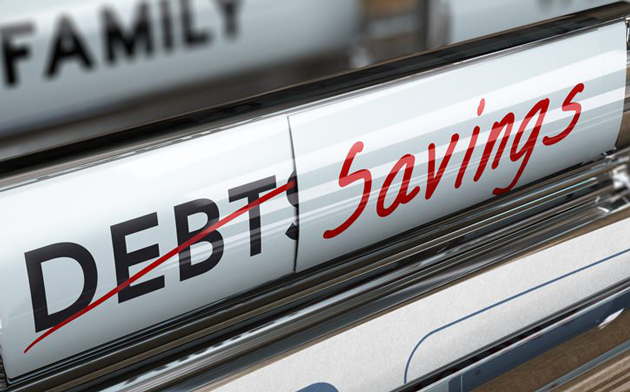Ever seen a report that claims a certain kind of food is bad for you? Then, a couple weeks later, there’s another report saying the same food is good for you?
It’s usually not the food itself but what you do with it that makes it “good” or “bad.” The same goes for debt. Like drinking red wine or eating bacon, managing debt is all about how responsibly you’re handling your intake.

Turning credit into debt, and back again
It might seem like “credit” and “debt” are used interchangeably, but they actually refer to two distinct things. Simply put, credit exists before you make a purchase. Debt appears after.
Think about the most expensive purchases you’ll ever make—buying a house or car, going to college, starting a business, etc. Also think about emergencies: a broken-down car, a leaky roof, or a hospital visit. Most people can’t pay for these things in cash. Credit lets buyers access something now and pay for it later. Debt is what’s left over after the purchase is made.
But the relationship between the two doesn’t stop there. How well you handle your debt influences your credit. Think of it like a big circle of trust. Your financial institution loans you the credit, you pay it off on time to prove you can manage debt well, and this proof (in the form of a credit score) makes it easier and cheaper to borrow again down the road.
Through this process, debt becomes a valuable tool in building your financial identity.
Investing time and money
Well-managed debt isn’t about buying things you can’t afford—it’s about planning ahead to improve both your current and future situation. Think about college loans. While there are many reasons to pursue higher education, a higher salary is usually one of them. Students borrow money to invest in themselves, hoping that education will bring career advancement and, ultimately, a higher monetary return. Without taking on initial debt, that investment wouldn’t be possible.
Even for smaller purchases, debt works best when it’s part of a long-term financial plan. Borrow when you need it, then distribute the cost over time.
Managing the debt you have
Ultimately, the idea of “good” or “bad” debt isn’t about how specific activities affect your credit score, but how well you can manage that debt. On-time payments will keep your credit score strong, but managing debt involves more than paying monthly minimums. Your outstanding balance affects your credit score as well, so you’ll want to actively shrink that total. There are a few tricks to this:
- Take advantage of automatic payments. If you’re juggling multiple accounts, it can be easy to forget a payment. You’re better off eliminating the risk—and saving yourself the trouble of remembering—with automatic, scheduled payments each month.
- With credit cards, always pay more than the minimum. It’s not enough to just keep your payments current—you want to watch your debt shrink. Especially for credit cards, if you’re paying only the minimum, you’re doing little more than paying off your interest each month.
- Put your extra cash toward your lowest balance account first. Even if it’s not the account with the highest interest rate, there can be a real psychological benefit to having one less account to worry about.
In theory, you could lead a completely debt-free existence, but if you want to take full advantage of your financial possibilities, it’s probably not the best plan. What’s most important is developing a financial strategy that works for you and shows future lenders that you control your debt, it doesn’t control you.


